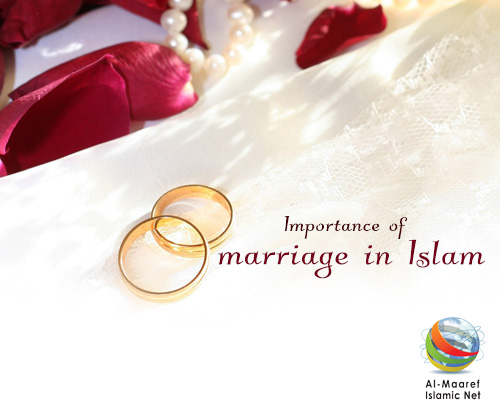Introduction
There are a group of dues which The Most High Allah gave to the husband,
so that he will carry out his role by means of them. The divine doctrine
confirms the necessity of considering these dues and of committing to them; it
is even related that Allah’s prophet (Allah’s prayers and peace bestowed upon
him and his Household) said, «The one, among all the people, who has the
greatest due on the wife is her husband; and the one, among all the people, who
has the greatest due on the man is his mother.»1
What Are the Dues of the Husband?
Here, we are going to refer in detail to each one of the dues of the
husband.
1- The Due of Sexual Enjoyment
The husband has the due of the sexual intercourse with his wife. The
wife must comply with the desire of the husband to get his natural and religious
due unless there is a certain religious prevention, such as the wife’s being in
the menstruation period or in post pregnancy period when it is religiously
forbidden that the husband and the wife undergo the complete sexual process
whereas all the other sexual enjoyments rather than the intercourse are
permissible.2
In one narrative, it is related that one woman went to Allah’s prophet (Allah’s
prayers and peace bestowed upon him and his Household) and asked him, «O Allah’s
prophet! What is the husband’s due on the wife?» He (Allah’s prayers and peace
bestowed upon him and his Household) answered her, «It is to obey him and not to
renounce allegiance to him; not to give any alms from his house without his
permission; not fast to a desirable fast without his permission; and not to
prevent him from having sexual intercourse with her even if [he asks for it]
over a saddle.»3
To be concluded, the wife must be completely ready to comply with her husband’s
sexual desires, so that she will provide him with the immunity he is looking for
in this point.
* Beautifying Herself for Him
By this, it is meant that her husband should see her always in a form which
pleases him and attracts him to her by means of putting on the clothes which he
likes, putting the perfumes which he finds amiable, and the like from the issues
which the wife knows that they present her beautifully in front of her husband’s
eyes.
It is related that Imam Al-Sadik (Allah’s peace bestowed upon him) said, «The
wife can not, as regards the relationship between her and her husband, do
without three characteristics: She must up keep herself from every abomination,
so that his heart will be at ease with her in weal and in woe. She must also
attend to him, so that this will plead for her if she does something wrong. And
she must show love to him through being fascinating and comely looking in his
eye.»4
Problems Related to the Due of Sexual Enjoyment
The husband must pay attention to another important issue: It is that the
fulfillment of the sexual need and the reaching of the state of sexual
satisfaction is not restricted to him only; the wife has the due of reaching the
state he reaches because that one of them fulfills his need without the other
doing so may result in a lot of problems.
Both the husband and the wife must, each by his/ her own way, attempt at solving
this problem. In case the wife is the one, as it is usual, who does not reach
the state of sexual satisfaction, this is usually due to that she is shy in her
relationship with the husband; then, she contents herself with her husband’s
fulfillment of his need from her even if she has started a relation without
completely fulfilling her own desire. Such an error has its negative influence
on the psychology of the wife; reflects on her practical performance; and adds
to her feeling that she is wronged with him and that he gets what he wants
whereas she gets nothing in return.
Then, how can the husband and the wife solve this
problem?
The successful relationship is not the one in which the woman complies with the
needs of the man only; it is the one in which the man also complies with the
needs of the woman. As the woman complies with her husband with respect to what
he asks for, so that he will fulfill his desire, he must comply with her with
respect to what she asks for, so that she will fulfill her desire as well. It is
related in one narrative that The Prince of the Believers (Allah’s peace
bestowed upon him) said, «When any one of you wants to have a sexual
intercourse with his wife, let him not hurry her because women have needs.»5
2- The Due of Giving the Wife the Permission to Get Out
of the House
The second due for the husband is to give his wife the permission in
case she wants to get out of the house because it is not permissible for the
wife to get out of the house without her husband’s permission.
The due of giving the wife the permission to get out of the house is constant
for the husband i.e. in case the woman conditions on her husband in the marriage
contract that it is not his due to prevent her from getting out of the house,
then the condition is considered to be abolished yet the contract is still
correct.6
It is related in one narrative that The Noblest Prophet (Allah’s prayers and
peace bestowed upon him and his Household) said, «…and not to get out of her
house without his permission: In case she gets out without his permission, the
angels of the sky and the angels of the earth and the angels of wrath and the
angels of mercy will be cursing her till she gets back to her house.»7
The due of giving the wife the permission to get out of the house is a central
point in the authorities of the man. Moreover, not getting out of the house has
to do with the administrative issue and with the organization of the family.
Some women may ask, «Is not this an injustice committed against the woman- We
seek refuge with Allah?» In fact, when we recognize that this due is a part of
the administrative circle of the man, then it becomes normal and fair. It is
considered so also when the man has received an education with which he fears
The Most High Allah, takes into consideration the humanity of his partner, is
cognitive in his administration so that getting out does not turn to be an
impediment, as long as it has to do with him, as regards giving the permission
and, as long as it has to do with her, as regards repeating it in a manner which
wastes the nature of the martial life.
The authorities which Islam gives to the husband are actually a criterion
telling the wife, «Consider your condition well, for it is impermissible that
you remain out of the house without permission.» This is so because the husband
gets vexed when he finds his wife out of the house most of the time and when she
slights her presence in the house; this is in fact in opposition to the
characteristics of the sound familial life. Henceforth, the wife must take the
following measures.
At first, she must take cautiousness as regards choosing the times of getting
out of the house, so that they will not be contradictory with the desires of the
husband or with the other familial duties.
Secondly, she must take into consideration that she does not have a religious
due to get out of the house without her husband’s permission. Once she considers
this, she will feel content because as long as it is not her religious due, she
will accept this issue in an act of commitment to the divine laws.
On the other hand, the husband should, from the moral and human aspects,
consider her own desires and privacies and does not be selfish and stern to the
extent of hurting her feelings; he must give her a reasonable freedom and be
somehow flexible in this issue. The problem, therefore, is not due to the
administrative organization and criterion; it is due to the performance and
practice which are the points actually in need to be reviewed and followed up
because they are what cause troubles to the woman most of the time.
3- The Due of the Settlement of the Administrative
Issues in the Family
As an indirect result of the dutifulness of the expense with which
the husband is assigned comes the third due of the husband which is the due of
the settlement of the issues which have to do with the financial administration
of the house. When it is demonstrated that spending on the family is from the
duties of the husband, then it is natural that he does not spend but on what he
is convinced of and on what he deems to be for the welfare of the family.
The settlement of the affairs in the family has in fact a central relationship
to the expense which is mainly manifested in the financial affair. Still, it may
apply to other affairs like the educational issue and other issues in case they
are related to the issue of expense. In case the husband and the wife disagree
concerning the educational issues, like the husband’s wish to admit the children
to a specific school whereas the wife wishes to admit them to another school,
then the settlement at the end is to the husband because he is going to pay the
money for any school of them since Islam assigned him with the responsibility of
educating and spending on the children. It is related that Allah’s prophet
(Allah’s prayers and peace bestowed upon him and his Household) said, «…and not
to give anything without his permission. If she does so, she is going to bear
the sin while he is going to be granted the reward…»8
The Limits of the Dutifulness of Obedience
Out of the frame of this circle i.e. the circle of the expense of the
husband and his due of sexual enjoyment, the husband does not have the due to be
obeyed: In case he asks his wife to commit something forbidden, then it is not
permissible that she obeys him in this issue.
The husband has the due of decision as regards the common issues which are in
need for a decision. Yet as regards the personal conducts- such as: disposing of
her own money, talking in a specific manner, performing a particular action,
refusing to possess a certain thing, or any other point that does not have to do
with the due of sexual enjoyment or the due of giving the permission of getting
out of the house- they are considered to be her own business as regards of which
he does not have the due to impose anything on her.
As regards this point, Imam Al-Khomeini (May his secret be sacred) said, «It is
not of recalcitrance that she does not obey him as regards what is not dutiful
on her. In case she does not do the house services and needs which are not
related to the due of sexual enjoyment, like sweeping, sewing, cooking, or the
like even bringing him water and sweeping the bed, then she has not done
recalcitrance.»9 This is so because the service of the house and what
is related to that are not dutiful on her.
1- List the dues of the husband which the wife must take into consideration?
2- What are the limits of the dutifulness of the wife’s obedience to her
husband?
3- Is the due of the husband of giving the wife the permission to get out of the
house considered to be an injustice committed against the wife? Why?
4- On what basis do we deduce that the conflicting issues concerning the
financial administration of the house must be settled by the husband?
5- List the etiquettes of the wife’s relationship with her husband.
1- Meezan Al-Hekma
[The Standard of Sagacity]/ Part Two/ Page 1184
2- Tahreer Al-Waseela [Editing the Means]/ Imam Al-Khomeini (May his secret be
sacred)/ Dar Al-Kotob Al-Ilmeeya [The House of the Scientific Books]/ Part One/
Page 53
3- Al-Sihah/ Al-Jawahri/ Dar Al-Ilm Lil Malayeen [The House of the
4- Meezan Al-Hekma [The Standard of Sagacity]/ Mohammadi Al-Rishahri/ Part Two/
Page 1185
5- Wasael Al-Sheeaa [The Means of the Shiite]/ Part Thirty/ Page 118
6- Tahreer Al-Waseela [Editing the Means]/ Imam Al-Khomeini (May his secret be
sacred)/ Part Two/ Page 302
7- Makrem Al-Akhlaq [The Loftiest Morals]/ Sheikh Al-Tobrossi/ Page 214
8- Al-Kafi [The Sufficient]/ Page 508
9- Tahreer Al-Waseela [Editing the Means]/ Part Two/ Page 305




















